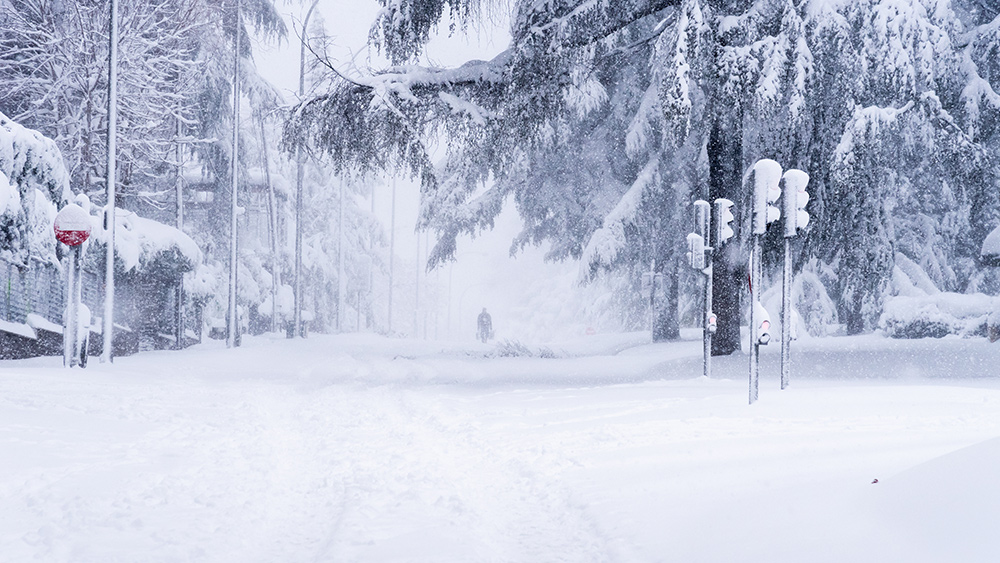Governments wasting TRILLIONS on “climate change” using faulty temperature data, experts warn
02/07/2024 / By Ethan Huff

The only reason why it seems like global temperatures are rising is because a whopping 96 percent of the National Oceanic and Atmospheric Administration’s (NOAA) temperature monitoring stations are located in “urban heat islands” next to things like warm exhaust fans and “blistering-hot rooftops.”
Despite trillions of dollars in taxpayer-funded mitigation measures that have been implemented over the years, 2023 was still said to be the hottest year on record, according to the NOAA. However, we now know that this is because the federal agency’s thermometers were intentionally placed near really hot urban structures, which ultimately skewed the data.
For years, the United Nations (UN) has been warning that global temperatures can only warm 1.5 degrees Celsius in the coming years. Anything more than that will make the planet unlivable, resulting in major catastrophes like droughts, flooding and extreme heat.
Based on the skewed temperature readings from the NOAA’s monitoring stations, the earth is already 1.35 degrees Celsius warmer than the pre-industrial average noted by the UN, meaning there is only 0.15 degrees Celsius more for it to warm before the planet melts.
“Not only was 2023 the warmest year in NOAA’s 174-year climate record – it was the warmest by far,” commented Sarah Kapnick, the NOAA’s chief scientist. “A warming planet means we need to be prepared for the impacts of climate change that are happening here and now, like extreme weather events that become both more frequent and severe.”
What Kapnick failed to mention is the fact that her own agency’s measuring standards are flawed, and the earth is not, in fact, warming to the degree that the NOAA says it is, if at all.
(Related: By 2030, the world will face “severe cold and food shortages” as a grand solar minimum takes over the planet, solar researchers say.)
Heat bias means fake global warming
Anthony Watts, a meteorologist and senior fellow for environment and climate at The Heartland Institute, as well as author of the climate website Watts Up With That, examined the NOAA’s climate stations and reported that the agency’s climate claims are laughably flawed.
More than 90 percent of the NOAA’s temperature stations, Watts found, have a clear heat bias, meaning they record temperatures that are too high compared to actual temperatures outside of urban heat islands.
“And with that large of a number, over 90 percent, the methods that NOAA employs to try to reduce this don’t work because the bias is so overwhelming,” Watts told the Epoch Times.
“The few stations that are left that are not biased because they are, for example, outside of town in a field and are an agricultural research station that’s been around for 100 years … their data gets completely swamped by the much larger set of biased data. There’s no way you can adjust that out.”
Fellow meteorologist Roy Spencer, an esteemed principal research scientist at The University of Alabama, agrees on this point.
“The surface thermometer data still have spurious warming effects due to the urban heat island, which increases over time,” he says.
Spencer serves as the U.S. Science Team leader for the Advanced Microwave Scanning Radiometer on NASA’s Aqua satellite. He is the recipient of NASA’s Exceptional Scientific Achievement Medal for his work in satellite-based temperature monitoring.
Even worse than the NOAA’s urban heat island temperature stations are the computerized climate models that climate zealots are using to drive changes in energy policy, which aim to shift the West away from earth-based “fossil” fuels into “green” energy technologies like solar and wind.
Man-made climate change is a farce (unless you mean the consequences of deliberate geoengineering). Learn more at Climate.news.
Sources for this article include:
Submit a correction >>
Tagged Under:
big government, Censored Science, Climate, climate change, data, Ecology, environment, fraud, global warming, green tyranny, NOAA, real investigations, rigged, science clowns, science deception, science tyranny, temperatures, urban heat islands
This article may contain statements that reflect the opinion of the author
RECENT NEWS & ARTICLES
COPYRIGHT © 2017 CLIMATE SCIENCE NEWS




















